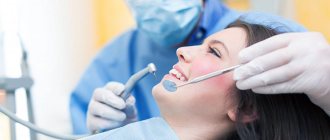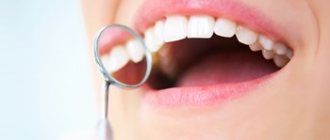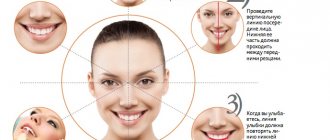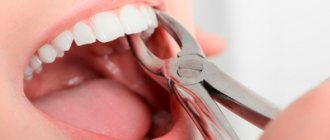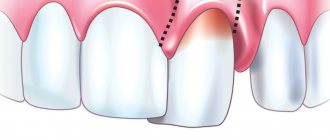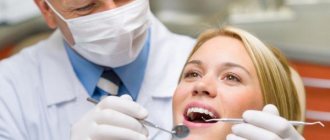Pregnancy is a time when you need to take care of your health, and dentistry plays an important role here. After all, changes in immunity and hormonal levels can lead to teeth becoming more fragile and susceptible to destruction. Therefore, it is best to undergo treatment in advance. But if it doesn’t work out, then doctors have established action algorithms in this regard - what treatment can be carried out and what should not be done.
What is the best thing to do before pregnancy?
Even one pregnancy and breastfeeding of one child can trigger the occurrence of caries or periodontal disease. The risk is much higher if you have twins or two children with a small age difference. Carrying a child requires a lot of the body's resources, and although the doctor may recommend mineral supplements, they are not able to compensate 100% of the losses. Therefore, the strength of the enamel of teeth and their roots is reduced. If there has been no caries, there is a risk that it will appear; if it has already happened, it can quickly develop to the 3-4th stage, and the installed fillings will begin to fall out due to weakening of the tooth tissues.
Therefore, ideally, before planning a pregnancy, it is worth treating all teeth, replacing old fillings, and strengthening the enamel - remineralization. If you have inflammation of the gums, then be sure to undergo treatment to prevent the development of periodontal disease.
The dentist performs ultrasonic cleaning in several stages:
- Tartar and hardened plaque are removed using a device called a scaller equipped with a round nozzle. The tail of the nozzle allows you to knock down tartar without damaging the enamel. Cleaning is carried out with the utmost care, so it takes from 20 to 60 minutes.
- The dentist removes hardened plaque using the Air Flow method: the enamel is cleaned by exposure to a stream of water, fine powder particles and air. Soda or glycine can be used as a cleaning powder. The Air Flow method is used without preliminary treatment of the enamel with an ultrasonic scaler if the tartar is weakly expressed.
- Mechanical cleaning of tartar and plaque leaves unevenness on the enamel, so a specialist polishes the teeth. The procedure is performed using grinding attachments on the scaler: brushes, strips and rubber bands. Polishing does not lead to a thinning of the enamel layer, but only removes the smallest particles of mineralized plaque that were not separated during ultrasonic treatment.
- The last stage of work is fluoridation of teeth, which allows for remineralization of the enamel. A fluoride-containing gel is applied to the teeth and then heated with a special lamp. Under the influence of heat, the enamel actively absorbs the components of the gel.
Ultrasonic cleaning helps prevent the development of gingivitis - an inflammatory process of the gums and oral mucosa. It must be remembered that gingivitis is often observed during pregnancy, even if you practice oral hygiene every day.
What treatment can be done during pregnancy?
- Any emergency treatment
Toothache is not just an unpleasant symptom, but a signal that an acute process has already begun. The pain is difficult to bear, and taking painkillers is not recommended for pregnant women, at least without consulting a doctor. Moreover, if the pain weakens or disappears on its own, this is even worse - it means that the nerve of the tooth has begun to deteriorate. Serious inflammation of the gums or periosteum can begin unnoticed. Also, during pregnancy, general immunity decreases, which creates an increased risk that the infection will spread and pose a threat to the health of both mother and child.
Deep caries threatens the development of complications
For any toothache, it is definitely recommended to immediately go to the clinic and undergo treatment. There are anesthesia drugs that can be used when treating pregnant women, and there are also approved antibiotics (prescribed by a doctor). There will be no harm from them, but the risks from lack of treatment are great.
- Planned treatment of caries
If it was not possible to cure the tooth in advance or caries developed quickly after pregnancy, it is better not to wait until pain arises and emergency treatment is required, but to consult a dentist as soon as possible. The optimal time for this is after the 12th week of pregnancy. As we have already said, treatment will not harm the health of the unborn child, but its absence after a few months can lead to complications.
After the birth of a child, it is difficult to visit the clinic in the first months, so postponing treatment until later is not recommended
- Professional hygiene
For those who care about dental health, it is recommended to have professional cleaning – Air Flow or ultrasonic – once every 6-12 months. This procedure does not require anesthesia, it is harmless, but it helps maintain dental hygiene - and therefore maintains their health.
Air Flow and ultrasound – harmless and painless procedures
Contraindications to teeth cleaning in the clinic
Some doctors list pregnancy as a contraindication, but this applies to a specific number of procedures. Dentists at the Planet of Childhood clinic in Moscow select a cleaning method for expectant mothers that cannot harm their health and the health of their future children.
However, if a pregnant woman has the following diseases, then professional cleaning is prohibited:
- epilepsy;
- venereal diseases;
- infections that are transmitted by airborne droplets;
- diabetes;
- allergies to certain substances and drugs;
- asthma;
- hepatitis;
- HIV;
- Chronical bronchitis;
- any cancer;
- presence of a pacemaker implant.
Before allowing or prohibiting a pregnant woman from having professional teeth cleaning, the doctor must conduct an examination. So, you definitely need to take a blood test: even if you do not have diabetes, but your sugar levels are elevated, it is better to refuse cleansing.
Cleaning for pregnant women never implies subsequent teeth whitening, since this will have to be postponed until the moment when the woman not only gives birth, but also stops breastfeeding.
Procedures that should not be done
- Installation of veneers or aesthetic fillings
Although it is not considered a risky procedure, it is nevertheless not recommended. The reason is that any medical interventions during pregnancy should be carried out only when indicated. Aesthetic problems can be solved after the birth of a child.
- Whitening
The reason is the same - the procedure is not therapeutic - it can be postponed until later. In addition, now all medical drugs and equipment are certified; for this purpose, studies are carried out, in which pregnant women usually do not participate. Therefore, there is a formal ban.
- Treatment by an orthodontist
It would seem that wearing braces while on maternity leave is a great idea, because you don’t have to go to work or communicate with colleagues. But in fact, many orthodontists are against this decision. Firstly, during pregnancy and subsequent breastfeeding, bone tissue density may temporarily decrease and the course of treatment will differ from the standard. It is difficult to predict this, so to some extent such a procedure is risky. Secondly, immediately after the birth of a child, a woman cannot always leave him to go to the clinic for an appointment on the appointed day. And it is very undesirable to postpone visits to the orthodontist - it is not recommended to violate the treatment schedule.
It is much easier to choose clear aligners that are invisible to others, and undergo treatment when it is truly convenient for you.
There is no need to “hide” with aligners; the treatment goes unnoticed by others
Thus, the general opinion of dentists is:
- Treatment should be carried out before pregnancy or after 12 weeks.
- Do not put off treatment until later.
- On the contrary, all aesthetic procedures can be completed after the birth of the baby.
Other articles:
- What is more profitable – aligners or braces?
- Reflections braces - their advantages
What expectant mothers are afraid of: not everything is so scary!
Whether pregnant women can have their teeth brushed depends on the woman’s individual characteristics, stage of pregnancy and health status. You will have to visit a doctor, but before that you need to undergo an examination by a gynecologist and make sure that there are no contraindications for cleaning:
- Problems in the health of the expectant mother - cardiac dysfunction, viral and colds, HIV infection, etc.
- Pregnancy pathologies, such as uterine hypertonicity, fetal hypoxia, hormonal disorders.
- If there are implants in the mouth, this is reported to the doctor (as well as a possible pacemaker).
- If anesthesia is needed, stop at local.
Important! The first trimester, up to the 12th week inclusive, is considered an undesirable period for the cleaning procedure. At this time, it can be dangerous to treat teeth, because the placenta has not yet formed, and the embryo is not protected from the effects of medications. A sharp release of adrenaline by the mother’s body due to fear of pain will also have a negative impact.
In the third trimester, the risk of uterine hypertonicity and premature birth increases. The ideal period when it is possible to perform dental manipulations is the 2nd trimester. The fetal body is actively developing, the skeletal system is being formed. At this time, he actively uses calcium, phosphorus, fluorine from the mother’s body - her teeth suffer. If a woman feels well and has a high pain threshold (not sensitive to minor pain), she can have her teeth brushed during pregnancy at any stage.
Important! If there is a choice between an acute sense of fear or mild anesthesia, it is better to choose the latter option.
It is necessary to remember that drugs based on the anesthetic substance articaine (“Ultracaine”) are considered relatively harmless. Before use, the dentist must find out if there is an allergy to it.
Is it safe to use anesthesia and x-rays?
The specialists of the Comfort Dentistry clinic use modern treatment technologies. For pregnant women, we use an articaine-based pain reliever. It does not penetrate the circulatory system and the placenta, does not constrict blood vessels, and therefore is harmless to the fetus. The advantage of such anesthesia is that it reduces stress for the woman and calms the nervous system.
As for dental x-rays, it is not as dangerous as x-rays of the lungs, which is prohibited for pregnant women. Still, it is better to refuse radiation. If there is an urgent need, dental x-rays are allowed in the 2nd trimester. At the same time, for safety, the woman’s stomach is covered with a lead apron that does not let the rays through. The most harmless alternative to x-rays is digital radiovisiography.
Features of dental treatment
We often hear around us that pregnancy is not a disease. If it proceeds normally and there is no threat of miscarriage, you can live a normal life, including dental treatment if necessary. However, there are a number of features of therapy for this category of citizens.
First of all, the woman’s health status and the course of pregnancy, the presence of fetal development pathologies are taken into account.
So, the following are subject to urgent treatment during a favorable period of gestation:
- caries;
- pulpitis;
- periodontitis;
- stomatitis;
- gingivitis;
- periodontitis;
- glossitis;
- cheilitis.
It is mandatory to provide assistance for injuries and chipped teeth, as well as surgical operations for abscesses or periostitis. Other dental surgeries can wait until after the baby is born. For example, whitening, installation of braces or an implant can easily wait until a woman leaves the maternity hospital.
Various dental materials can be used to fill canals and holes in a tooth. They are selected according to indications or replaced if the girl has an allergic reaction during use.
Lamps used to quickly harden the material do not harm the pregnant woman and her baby.
No less important for a woman is the fact that she will not have to endure pain when the doctor intervenes. There are types of anesthesia that are safe for pregnant women and are used by dentists. The main thing is to clarify this issue before starting treatment. The only contraindication is anesthesia; it negatively affects the condition of the fetus.
Thus, expectant mothers have access to almost all dental treatment procedures within reasonable limits. The main thing is to find out in advance from the supervising doctor from what week of pregnancy you can treat your teeth . And then boldly begin preparing yourself for childbirth.
How to care for a pregnant woman's teeth
In most cases, dentists' recommendations are purely general. No additional manipulations are required, especially if the woman has not previously suffered from diseases of the maxillofacial region. This includes regular hygiene and preventive examinations with a doctor. However, there are a number of recommendations for such patients, taking into account their condition:
- Brush your teeth after every meal or at least rinse your mouth.
- It is prohibited to use hard brushes and abrasive whitening toothpastes.
- It is recommended to buy an irrigator; it helps to get rid of food debris even in hard-to-reach places where a brush cannot reach.
- Rinsing is carried out only with those drugs approved by the doctor.
- Carry out ultrasonic teeth cleaning every trimester of pregnancy.
- In the first trimester, visit your doctor and clarify the rules for brushing your teeth; it is better to use toothpaste with a high fluoride content.
- For routine check-ups, it is recommended to visit the doctor once a week or at least once a month.
When wondering whether pregnant women have dental treatment , the answer is clear. Of course, the expectant mother should not suffer and pose a risk of developing an infection if her teeth require dental intervention.
If your spouse also needs dental procedures and treatment, it is better to undergo it together. After all, the slightest contact at the moment of a kiss provokes the transmission of infection.
Having decided at what time to treat a pregnant girl’s teeth and how this will affect her condition, you can safely contact a dentist for qualified help. You should not wait for the baby to appear to eliminate painful caries or pulpitis, which can provoke the development of infection. Moreover, both parents need to do this.
By contacting the clinic, the patient will receive highly qualified assistance from experienced doctors and a full examination with gentle methods of influence that will not harm the health of the girl and her unborn baby. Only innovative treatment methods and safe drugs that are approved for use during the prenatal period of a woman.
Consequences of improper treatment
A pregnant patient is a big responsibility for a dentist. He will need all the knowledge gained during work and study, and high qualifications of a professional. This does not mean at all that a woman’s body can react negatively to dental treatment, but clinical cases are different, and it is necessary to anticipate all complications.
The hormonal background of a woman during pregnancy is too unstable. He may react unpredictably to the doctor's interventions.
There are a number of possible consequences that arise as a result of poor quality treatment:
- Sharp jumps in blood pressure.
- Arrhythmia.
- Muscle spasms and severe cramps.
- Drowsiness and increased fatigue of the body.
The most unpleasant consequences, fetal pathologies and birth injuries can be caused by improper use of medications, as well as non-compliance with hygiene rules. An important factor is how long teeth can be treated . A doctor's mistake can have negative consequences.
That is why it is important to monitor your oral cavity even at the stage of pregnancy planning.
Provided that the conception occurred unplanned, it is recommended to undergo a medical examination as soon as possible and check with the dentist when and how to undergo treatment and eliminate dental problems, if any. Be sure to discuss plans for therapy with the observing gynecologist. It is important that the treatment procedure does not cause negative consequences for the woman and the unborn child.
